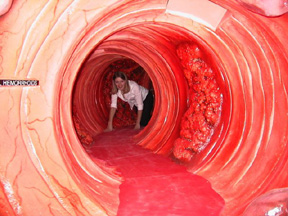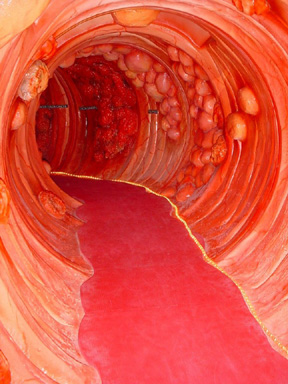 |
Molly McMaster crawls through the Colossal Colon. |
The American Cancer Society Douglas/Sarpy Colon Cancer Task Force is sponsoring “The Colossal Colon Tour” Feb. 10, 11 and 12, at Westroads Mall to educate the public on colorectal cancer.
The Colossal Colon, a replica of the large intestines, includes examples of healthy colon tissue, several non-cancerous diseases of the colon, polyps and various stages of colorectal cancer. The model also has windows for participants to look inside while standing outside of the model.
“Colon cancer comes on at any age and often without any symptoms, so we hope the Colossal Colon Tour will increase awareness of the disease,” said Sue Wardian, who serves as the representative for The Nebraska Medical Center/UNMC Eppley Cancer Center on the ACS Douglas/Sarpy Colon Cancer Task Force.
“Through testing, colon cancer is preventable,” Wardian said, urging individuals to get their first colonoscopy by age 50 and every five years thereafter.
 March is colon cancer awareness month so the ACS Douglas/Sarpy Colon Cancer Task Force again will have free fecal occult blood testing kits available beginning the first Sunday in March at area Bag ‘N Save supermarkets and No Frills Pharmacy’s. The tests look for hidden blood in the stool, which can be one indicator of colon cancer.
March is colon cancer awareness month so the ACS Douglas/Sarpy Colon Cancer Task Force again will have free fecal occult blood testing kits available beginning the first Sunday in March at area Bag ‘N Save supermarkets and No Frills Pharmacy’s. The tests look for hidden blood in the stool, which can be one indicator of colon cancer.
Colon cancer affects people of all ages, as demonstrated by Molly McMaster, a colon cancer survivor and the brainchild of the Colossol Colon Tour. McMaster was diagnosed with stage II colon cancer on her 23rd birthday on Feb. 19, 1999. Since then she has worked to raise America’s awareness of the disease. The Colossal Colon, created by Adirondack Scenic Inc., a custom design and fabrication company, is her latest venture. Read more about the Colossal Colon.
People of all ages are encouraged to visit the exhibit, which is touring the country. The Colossal Colon will be on the first level by Von Maur. Educational information also will be available, and volunteers will be on hand to answer questions about colon cancer and screenings.
According to the Colon Cancer Alliance, one out of 18 people in this country will develop colorectal cancer, which includes cancers of the colon, rectum, appendix and anus, in their lifetime.
With regular screening, colorectal cancer can be found early, when treatment is most effective. In many cases, screening can prevent colorectal cancer by finding and removing polyps before they become cancer. And if cancer is present, earlier detection means a chance at a longer life — generally, five-year survival rates for colorectal cancer are lower the further advanced the disease is at detection.
Although colorectal cancer can strike men and women at any age, more than nine in 10 new cases are in people aged 50 or older.
Symptoms of colorectal cancer include:
- The most common symptom is no symptom;
- Change in bowel habits (diarrhea, constipation, narrow stools);
- Unexplained weight loss, vomiting, lack of energy, unexplained anemia;
- Blood (often not visible) in stool or from rectum;
- Abdominal pain/discomfort (gas, bloating, cramps, feeling that bowel does not empty).
When there are symptoms present, diagnostic tests should be performed. In the absence of symptoms, regular screening should be done.